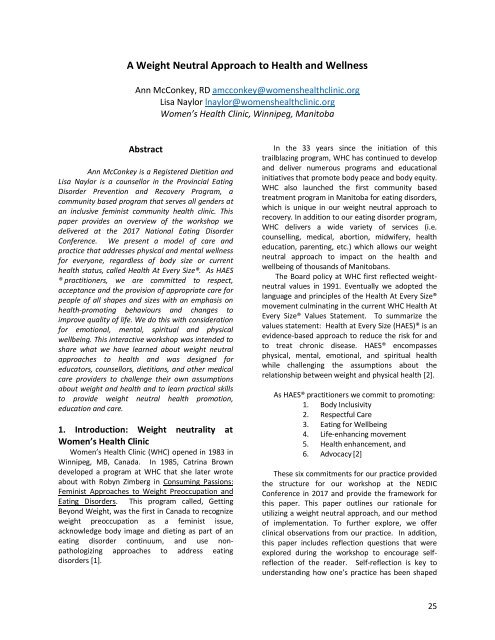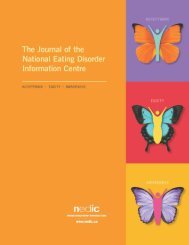NEDIC Conference Journal 2018
Create successful ePaper yourself
Turn your PDF publications into a flip-book with our unique Google optimized e-Paper software.
A Weight Neutral Approach to Health and Wellness<br />
Ann McConkey, RD amcconkey@womenshealthclinic.org<br />
Lisa Naylor lnaylor@womenshealthclinic.org<br />
Women’s Health Clinic, Winnipeg, Manitoba<br />
Abstract<br />
Ann McConkey is a Registered Dietitian and<br />
Lisa Naylor is a counsellor in the Provincial Eating<br />
Disorder Prevention and Recovery Program, a<br />
community based program that serves all genders at<br />
an inclusive feminist community health clinic. This<br />
paper provides an overview of the workshop we<br />
delivered at the 2017 National Eating Disorder<br />
<strong>Conference</strong>. We present a model of care and<br />
practice that addresses physical and mental wellness<br />
for everyone, regardless of body size or current<br />
health status, called Health At Every Size®. As HAES<br />
® practitioners, we are committed to respect,<br />
acceptance and the provision of appropriate care for<br />
people of all shapes and sizes with an emphasis on<br />
health-promoting behaviours and changes to<br />
improve quality of life. We do this with consideration<br />
for emotional, mental, spiritual and physical<br />
wellbeing. This interactive workshop was intended to<br />
share what we have learned about weight neutral<br />
approaches to health and was designed for<br />
educators, counsellors, dietitians, and other medical<br />
care providers to challenge their own assumptions<br />
about weight and health and to learn practical skills<br />
to provide weight neutral health promotion,<br />
education and care.<br />
1. Introduction: Weight neutrality at<br />
Women’s Health Clinic<br />
Women’s Health Clinic (WHC) opened in 1983 in<br />
Winnipeg, MB, Canada. In 1985, Catrina Brown<br />
developed a program at WHC that she later wrote<br />
about with Robyn Zimberg in Consuming Passions:<br />
Feminist Approaches to Weight Preoccupation and<br />
Eating Disorders. This program called, Getting<br />
Beyond Weight, was the first in Canada to recognize<br />
weight preoccupation as a feminist issue,<br />
acknowledge body image and dieting as part of an<br />
eating disorder continuum, and use nonpathologizing<br />
approaches to address eating<br />
disorders [1].<br />
In the 33 years since the initiation of this<br />
trailblazing program, WHC has continued to develop<br />
and deliver numerous programs and educational<br />
initiatives that promote body peace and body equity.<br />
WHC also launched the first community based<br />
treatment program in Manitoba for eating disorders,<br />
which is unique in our weight neutral approach to<br />
recovery. In addition to our eating disorder program,<br />
WHC delivers a wide variety of services (i.e.<br />
counselling, medical, abortion, midwifery, health<br />
education, parenting, etc.) which allows our weight<br />
neutral approach to impact on the health and<br />
wellbeing of thousands of Manitobans.<br />
The Board policy at WHC first reflected weightneutral<br />
values in 1991. Eventually we adopted the<br />
language and principles of the Health At Every Size®<br />
movement culminating in the current WHC Health At<br />
Every Size® Values Statement. To summarize the<br />
values statement: Health at Every Size (HAES)® is an<br />
evidence-based approach to reduce the risk for and<br />
to treat chronic disease. HAES® encompasses<br />
physical, mental, emotional, and spiritual health<br />
while challenging the assumptions about the<br />
relationship between weight and physical health [2].<br />
As HAES® practitioners we commit to promoting:<br />
1. Body Inclusivity<br />
2. Respectful Care<br />
3. Eating for Wellbeing<br />
4. Life-enhancing movement<br />
5. Health enhancement, and<br />
6. Advocacy [2]<br />
These six commitments for our practice provided<br />
the structure for our workshop at the <strong>NEDIC</strong><br />
<strong>Conference</strong> in 2017 and provide the framework for<br />
this paper. This paper outlines our rationale for<br />
utilizing a weight neutral approach, and our method<br />
of implementation. To further explore, we offer<br />
clinical observations from our practice. In addition,<br />
this paper includes reflection questions that were<br />
explored during the workshop to encourage selfreflection<br />
of the reader. Self-reflection is key to<br />
understanding how one’s practice has been shaped<br />
25




